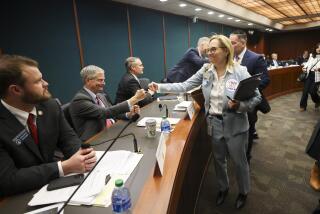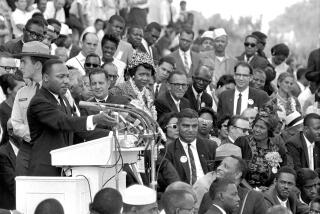Working Harder, Smarter to Define Islam
- Share via
“Whereas, the American Muslim community, comprised of approximately 5 million people, is a vital part of our nation . . . . “
So began a proposed bipartisan congressional resolution encouraging tolerance toward Muslims in America before Congress adjourned. Though well-intentioned, its necessity in the eyes of Arabs and Muslims is an ominous sign of the American Muslim community’s slow progress in maturing into a mainstream political voice.
For the record:
12:00 a.m. Dec. 16, 1999 For the Record
Los Angeles Times Thursday December 16, 1999 Home Edition Metro Part B Page 11 Op Ed Desk 1 inches; 28 words Type of Material: Correction
Muslims--In a commentary Dec. 13 by Mansoor Ijaz, an example of discrimination against followers of Islam was incorrect. It should have said secret evidence may be used against non-citizen followers.
For more than two centuries, immigrant communities have sought to have their ideas heard in shaping our nation’s agenda. Persecution in their homelands, whether political or religious, drove Irish Catholics, Jews, Latinos and others to our shores. The persecution they encountered once here drove these communities to develop influential lobbies for the causes that defined them.
America’s Muslim communities are no different. Islam’s controversial nature in U.S. society stems from perceptions within the Judeo-Christian framework that it is a competitor religion, whose organizing principles reject a founding cornerstone of America: the separation of church and state. After all, true democracy is scarce in Islamic societies while Israel and virtually every Christian society in the world have adopted varying degrees of self-rule.
So it is that many American Muslims feel the need to redefine themselves when inappropriate, and often knee-jerk, reactions arise after tragedies, such as the Oklahoma City bombing and the TWA 800 and EgyptAir 990 crashes. But dubious congressional resolutions are not the way to achieve a better understanding of Islam or to provide for Muslim civil rights in America.
The better response to anti-Muslim discrimination--whether evidenced by ethnic and religious profiling at airports, the use of secret evidence to imprison American citizens who adhere to Islam or allowing special interests to bar qualified American Muslims from serving in public capacities--lies in the long and painstaking process of educating our fellow citizens and political leaders. America’s Arabs and Muslims must learn to articulate positions of ethnic and religious sensitivity by placing emphasis on promoting and protecting U.S. security interests first, not on introducing biases rooted in misguided allegiances to causes and religious doctrines transported from far-off lands. This will reduce mistrust of Muslims’ motives and focus the aim of Islamic agendas in the U.S.
Second, Arabs and Muslims must devote more time and financial resources to developing our voter base and to integrating ourselves more fully in the affairs of our local communities. No other society offers the opportunity to have rational voices heard as freely as America does.
Voter registration drives and frequent communal gatherings that promote interfaith dialogue and cross-cultural business ties are already a part of the American Muslim agenda and should be developed further. This increases inter-community trust, educates political leaders about what are often poorly understood issues and contributes an Islamic perspective to critical national debates.
Political influence arising from our organized voter banks should be reserved for issues that meaningfully improve the quality of people’s lives. Fine-tuning blunt instrument sanctions against countries, for example, where average Muslim men, women and children suffer consequences that make them hate America while brutal dictatorships continue their repression unabated, would be a better use of American Muslim activism than self-serving resolutions.
Ultimately, we must qualify ourselves to hold high public office and bring our intellects to bear directly on national security issues that require a more thorough evaluation and understanding of Islam and its impact on U.S. foreign and domestic policy. Lining the pockets of U.S. politicians who gratuitously congratulate themselves for the appearance of fairness in resolving to promote Muslims or condemning anti-Islamic behavior is a cosmetic fix.
It is the new ideas and contributions of emerging immigrant populations that constantly renew our democracy. Including the voices of qualified Arab and Muslim Americans in official policymaking is a vital component of this process in times when Islam is repeatedly--and falsely--invoked to commit acts against the U.S. and its interests.
Martin Luther King said it most eloquently: “Injustice anywhere is injustice everywhere. Anyone who lives inside the U.S. can never be considered an outsider anywhere in the country.” America’s Muslims deserve better than to be treated as outsiders in the land we love and want to protect. But we also bear the responsibility for earning our say in how our country is governed.
More to Read
Get the L.A. Times Politics newsletter
Deeply reported insights into legislation, politics and policy from Sacramento, Washington and beyond. In your inbox twice per week.
You may occasionally receive promotional content from the Los Angeles Times.










